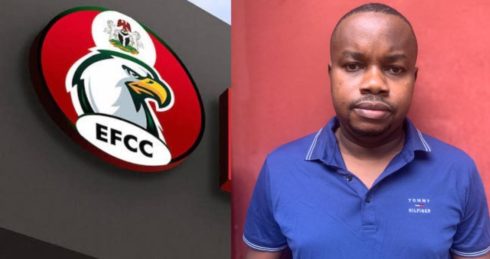The Enugu Zonal Directorate of the Economic and Financial Crimes Commission (EFCC) arraigned Rufus John Isip, a self-proclaimed forex broker, before Justice C. S. Onah of the Federal High Court in Uyo, Akwa Ibom State, on Friday, July 19, 2024. Isip, alongside his company, ITM-IT Resources Limited, faced an eight-count charge involving fraudulent conversion, money laundering, and obtaining funds by false pretence amounting to N2,022,081,172.
One of the charges against Isip reads: “That you, Rufus John Isip, while being the Director of ITM-IT Resources Limited, sometime between December 2020 and May 2021 in Uyo, Akwa Ibom State, within the jurisdiction of the Federal High Court of Nigeria, with intent to defraud, obtained the sum of N431,331,172 from Michael Okon, the Director of N-Rex Resources Limited, under the false pretence of investing in Vandera, an online investment platform, which you knew to be false, thereby committing an offence contrary to Section 1 (1) (a) of the Advance Fee Fraud and Other Fraud Related Offences Act, 2006, punishable under Section 1 (3) of the same Act.”
Another charge states that Isip converted N730,870,000 to cryptocurrency (Bitcoin) and transferred it to his Binance Wallet, knowing it was part of an unlawful act, violating Section 15 (2) (d) of the Money Laundering (Prevention and Prohibition) Act, 2011, punishable under Section 15 (3) (4) of the same Act. Isip pleaded not guilty to all charges when read to him in court.
Court Proceedings and Immediate Actions
Following Isip’s plea, Khamis Mahmud, the counsel for the EFCC, requested the court to remand him in EFCC custody, citing ongoing investigations into additional cases. The defense counsel, Samson Ewuje, did not object to this request. Consequently, Justice Onah adjourned the trial to October 14, 2024, and ordered Isip’s remand at the EFCC’s Uyo Zonal Directorate.
Isip’s arrest was prompted by a petition from Michael George, who alleged that Isip lured him into investing in an online trading platform called Vandora.io. According to the petitioner, Isip promised higher profits with a minimum trading capital of $100,000, encouraging George to recruit more investors. However, after the agreed 60-day period for profit realization, Isip disappeared, leading to the allegations of fraud.
Background and Implications
The charges against Isip highlight a significant financial crime involving sophisticated methods of deceit and exploitation of trust in online investment platforms. The EFCC’s involvement underscores the Nigerian government’s commitment to tackling financial crimes and ensuring justice for victims. The case has drawn attention to the need for investors to exercise caution and conduct thorough due diligence before committing funds to investment schemes.
This case also serves as a reminder of the regulatory challenges in the financial sector, especially with the rise of cryptocurrency transactions, which can complicate the tracing of illicit funds. The EFCC’s actions in this case are critical in setting a precedent for future cases and reinforcing the legal frameworks designed to combat money laundering and fraud.
The outcome of the trial will be closely watched, not only by the victims and their families but also by financial regulators and the broader public, as it will have significant implications for the enforcement of financial crime laws in Nigeria.
EFCC Also Secures Conviction in Kaduna Courts: Two Jailed for Currency Fraud
Justices R.M. Aikawa and Hauwa’u Buhari of the Federal High Court in Kaduna have handed down prison sentences to five individuals convicted of fraud. The convicts, Ibrahim Haruna, Abdullahi Yahaya, Daniel John (a.k.a Julieta), Benjamin Andrew Zagni (a.k.a Andrew Williams), and Kenneth Barau (a.k.a Aisha Mohammed), were prosecuted by the Kaduna Zonal Command of the Economic and Financial Crimes Commission (EFCC).
Haruna and Yahaya were specifically charged with currency counterfeiting, involving $81,700 in counterfeit notes. Their one-count charge reads: “That you Ibrahim Haruna and Abdullahi Yahaya on or about the 9th May, 2024 in Kaduna, within the jurisdiction of this honorable court had in your possession a total of eight hundred and seventeen (817) pieces of $100 USD (One hundred United State dollars) counterfeit notes when you knew that same are counterfeit and thereby committed an offense contrary to Section 5(1)(b) and punishable under Section 5(1)(c) of the Counterfeit Currency (Special Provisions) Act.”
Three Convicted for Internet Crimes By EFCC
In separate cases, Daniel John, Benjamin Andrew Zagni, and Kenneth Barau faced charges of impersonation, obtaining by false pretence, money laundering, and cybercrimes before Justice Hauwa’u Buhari. John’s charge reads: “That you Daniel John (a.k.a Julieta), between January and June, 2024 at Jos, Plateau State within the jurisdiction of this honorable court, falsely presented yourself as Julieta.
A white woman from Hungary on Facebook and Telegram to one Keta Kelemenne, and in that assumed character gained advantage for yourself the total sum of $80.00 from her, while claiming to assist her recover the money she had paid to previous online scammers, which you knew to be false and therefore committed an offence contrary to Section 22(3)(b) of the Cybercrimes (Prohibition, Prevention, etc) Act, 2015 and punishable under Section 22(4) of the same Act.”
Zagni and Barau were similarly charged and sentenced. Zagni’s charge states: “That you Benjamin Andrew Zagni (a.k.a Andrew Williams) sometimes in May, 2024 in Kaduna, within the jurisdiction of this honorable court, retained the total sum of $150 which you knew that such fund forms part of proceeds of an unlawful act and thereby committed an offence contrary to Section 18(2) (d) of the Money Laundering (Prevention And Prohibition) Act, 2022 and punishable under Section 18 (3) of the same Act.” Barau faced charges related to cybercrimes and was convicted and sentenced accordingly.
All five convicts pleaded guilty, and the prosecution counsel, M.U. Gadaka and K. Ogunlade, urged the courts to convict and sentence them accordingly. Justice Aikawa sentenced Haruna and Yahaya to seven years imprisonment each or a fine of N700,000.00. John received five years imprisonment or a fine of N400,000.00, while Zagni received four years imprisonment or a fine of N500,000.00. Justice Buhari sentenced Barau to two years imprisonment or a fine of N400,000.00.
In addition to their sentences, John, Zagni, and Barau forfeited their phones, used in the commission of their crimes, to the federal government. These convictions are part of the EFCC ongoing efforts to clamp down on internet fraud and currency counterfeiting across Nigeria
Table of Contents
Discover more from OGM News NG
Subscribe to get the latest posts sent to your email.














